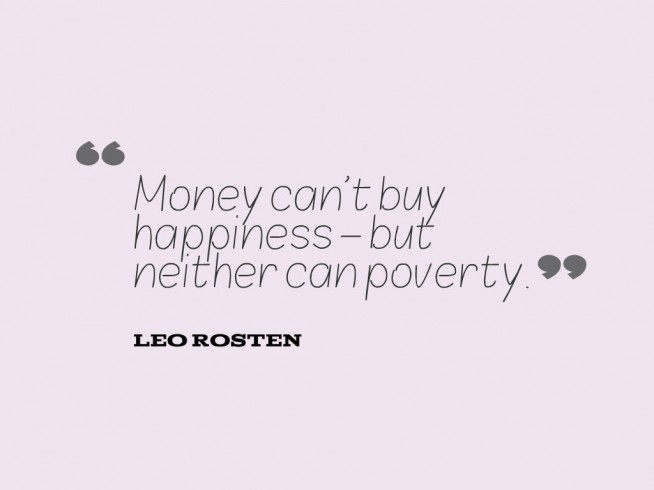We are proud to showcase this post from our Positively Positive B-School Alumni, a private group of graduates of Marie Forleo’s B-School online training program for modern entrepreneurs.
Click HERE to be notified when enrollment in B-School opens up in early 2016 (which includes FABULOUS bonuses from Positively Positive).
Imagine getting a raise of $500 per month.
Would that make you happy?
Sure it would!
Until you find out that everyone else in your company is getting a raise of $1000 per month.
You’d have more money, but you’d still be in a horrible mood.
So, isn’t that proof that money does not always make you happy? As popular as the well-known statement might be, it’s far too simplistic.
Humorist Leo Rosten said:
“Money can’t buy happiness – but neither can poverty.” via Leo Rosten @simplyilka
(Click to Tweet!)
Have you ever worried about how to pay your next bill? I surely have, and it is not a nice experience. Admittedly, it’s nicer when we do have enough money, so that we don’t have to worry about paying our bills and paying our rent. We can afford treats like a day spa or a fancy dinner, and that can make us feel good and — of course — happy.
So, it seems like the truth about money and happiness is more complicated than a one-line sentence. That’s because we human beings are very complex. And that’s a good thing!
What we can learn from lottery winners
There is a fascinating study about major lottery winners. It shows that at the moment of winning the lottery, the winners were absolutely euphoric and happy, yet after a while, they went back to the level of happiness they had before winning the lottery.
The lottery winners adapted to the situation and went back to their old behaviors. Their happiness was only short-term, not long-term.
The science of happiness
Scientifically, our bodies produce hormones in the brain for short-term happiness. Exactly the kind of happiness the lottery winners felt while winning — the euphoric happiness and good feelings.
These hormones are also called brain hormones due to their production in the brain compared to other hormones produced in other body parts (e.g., in the thyroid and the pancreas.) They act as neurotransmitters and pass along signals from one neuron to the next.
The hormones related to happiness are serotonin, endorphin, dopamine, and oxytocin. The release of these hormones is triggered by many factors, receiving money being only one of many.
These hormones are important. They are a reward for us that allows us to enjoy these happy feelings. They keep us going, but not forever, as proven by those lottery winners. Forever needs a non-chemical component as well.
Your value system: The foundation for long-term happiness
My grandparents had to live through two world wars. During this time, they lost a lot: their home, all their money, and my grandfather even lost his leg. All they had left were each other and the strength to go on. But even my grandparents recovered from their losses; the experience of the past was engraved in their memories.
That’s why my grandfather wanted to pass something on to me.
“He used to say, “You know … always remember that people can take everything from you. They can take your home, your money, and even your health, but what you have in here,” he pointed to his head and then his heart, “nobody can take away from you.”
Such sayings of his instilled a strong value system in me and taught me priorities. My values were, and still are, far from materialistic.
I think we have to evaluate our value systems. What are our priorities? Money in itself is neither good nor evil. But how important it is to us can make a difference. There are rich people who only care about getting richer and poor people who only think about becoming rich. They ignore all other values just to get money.
But money alone does not make us happy. It can help us to feel secure and to worry less. But to maintain happiness, we need other values as well.
I wish you long-term happiness
Take an honest look at your relationship with money and where it stands in your priorities.
You might give money too much power by either adoring it or condemning it.
Make money neutral. You’re allowed to.
And give that power to values that benefit you and others.
What values can you think of?
How do you feel about love, honesty, respect, fairness, and friendship?
Make those your values, and be proud of them.
The reward is great!
The reward is long-term happiness!
 Ilka Emig is a crazy, but lovable scientist, who’s on a mission to make science simple and fun for everyone. Join her quirky fun at http://simplyilka.com/welcome/ and follow her antics on Twitter.
Ilka Emig is a crazy, but lovable scientist, who’s on a mission to make science simple and fun for everyone. Join her quirky fun at http://simplyilka.com/welcome/ and follow her antics on Twitter.
Image courtesy of quotescover.com












